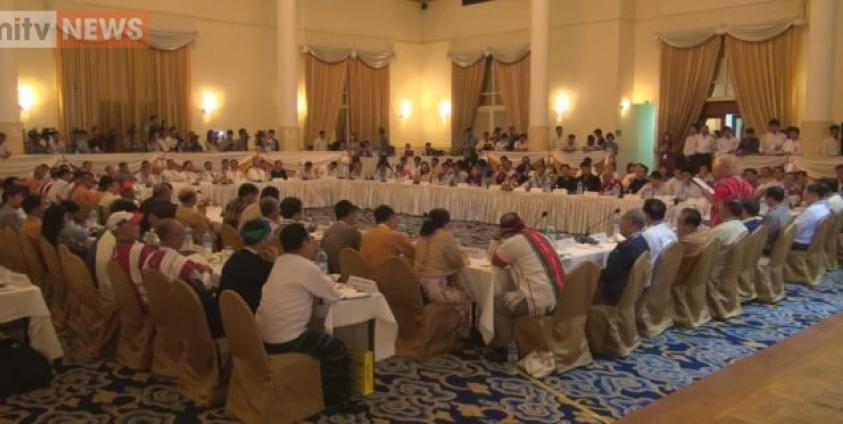The draft framework for political dialogue (FPD) is now almost completed according to reports coming from the FPD consultations in Rangoon, which ended on 10 July.
Once the nationwide ceasefire agreement (NCA) has been signed the ethnic armed organisations (EAOs) and government negotiating teams will have 60 days to come up with a political framework that will finalise the details of the political dialogue, which has to start within 90 days of the NCA being signed.
Points discussed and decided upon in the NCA political framework talks will include the participants in the political dialogue, what will be discussed in the political dialogue and the order it will be discussed in.
The FPD, which has been drawn up by civil society organisations (CSOs) and political parties, is their list of what they believe should be included in the political dialogue. The various organisations involved drew up their own FPD drafts and discussed which points should be included in the final draft FPD at the FPD consultations which were held from 16 May to 10 July.
The EAO and government representatives will discuss the points in the draft FPD at their political framework discussions and decide which of them, if any, to incorporate into the NCA political dialogue.
Hannes Siebert, an academic who advised all the groups creating their own FPD drafts said of the FPD: “Unlike the NCA draft, it is not an instrument for agreement. On the contrary, it is an instrument for further negotiations.”
The draft FPD identifies areas that the parties involved in political dialogue have to agree upon and suggestions on how contentious issues could be resolved.
Examples of contentious issues include the number and make-up of the participants in the political dialogue and how decisions will be taken. For instance some people believe that the size and number of the groups involved in political dialogue is less important if decisions are decided by consensus rather than by a vote, because then larger groups would not have an advantage over smaller groups.
Technical teams from the Nationwide Ceasefire Coordination Team (NCCT), the National League for Democracy (NLD) and the 56- party alliance, and representatives from the Karen National Union (KNU), the Restoration Council of Shan State (RCSS), the Democratic Karen Benevolent Army (DKBA), the Karen Peace Council (KPC), the Myanmar Peace Center (MPC), the Euro Burma Office (EBO) and the Pyidaungsu Institute for Peace and Dialogue (PI) took part in the almost two-month long consultation.
The finalised draft is expected to be ready for consideration by the participating parties sometime this week. “As the NCA signing is expected during the first week of August, while the election campaigns are expected to begin on 8 September, we may have about three weeks to debate and approve on the FPD draft,” said a participant.
The topics discussed by the FPD consultation are as follows:
- Preamble
- Aims and objectives
- Principles
- Agenda and issues
- Steps and roadmap
- Mandate and managing process
- Consensual decision making formula and mechanisms
- Composition and criteria for participation and inclusivity
- Structures, mechanisms and procedures
- Support structures: Shared knowledge, technical background papers, research, deadlock breaking.
- Sequencing of agenda and process
- People’s participation and regional dialogues and consultations
- Communications: Internal, external and public
- Implementation process
Expanded and edited for BNI by Mark Inkey







